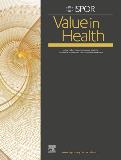Results Include Increase in Urine Drug Screens and Naloxone Prescriptions, But No Change in Rate of Prescribing High-Dose Opioids
 Lawrenceville, NJ, USA—March 4, 2020—Value in Health, the official journal of ISPOR—the professional society for health economics and outcomes research, announced today the publication of new research showing mixed clinical results of an electronic medical record (EMR)-embedded clinical decision support system for opioid prescribing. The report, “Clinical Effectiveness of Decision Support for Prescribing Opioids for Chronic Noncancer Pain: A Prospective Cohort Study,” was published in the February 2020 issue of Value in Health.
Lawrenceville, NJ, USA—March 4, 2020—Value in Health, the official journal of ISPOR—the professional society for health economics and outcomes research, announced today the publication of new research showing mixed clinical results of an electronic medical record (EMR)-embedded clinical decision support system for opioid prescribing. The report, “Clinical Effectiveness of Decision Support for Prescribing Opioids for Chronic Noncancer Pain: A Prospective Cohort Study,” was published in the February 2020 issue of Value in Health.
To promote patient safety, quality of care, and adherence to practice guidelines for safely prescribing opioids for chronic noncancer pain in the United States, Ochsner Health System implemented a multicomponent electronic medical record clinical decision support (EMR CDS) system in accordance with the 2016 US Centers for Disease Control and Prevention guideline. The EMR CDS directly targeted providers to increase awareness of best practices within their usual workflow. It incorporated an opioid health maintenance tool to display the status of risk mitigation, and the medication order embedded the morphine equivalent daily dose calculator and a hyperlink to the Louisiana pharmacy drug monitoring program.
After incorporation of the EMR CDS system, patients had higher rates of urine drug screens and naloxone prescriptions. In addition, specialty referrals to physical or occupational therapy, orthopedics, neurology, and psychiatry or psychology increased in the postintervention period. Although emergency department use decreased, hospitalization rates did not change. Furthermore, implementation of the EMR CDS did not change the main outcome of interest, namely, rates of prescribing high-dose opioids.
“Given the nationwide opioid crisis, health systems and providers must urgently find ways to extend opioid management beyond standardized monitoring of risk factors for misuse or abuse and set clear protocols for next steps in chronic care management,” said author Eboni G. Price-Haywood, MD, MPH, director, Center for Outcomes and Health Services Research, Ochsner Health System, New Orleans, LA, USA. “In this article, we show that technology optimization targeting providers may improve some aspects of opioid risk mitigation but may not as a single intervention change opioid-prescribing behaviors. Multilevel interventions that concurrently target patients, providers, health systems, and health policy are likely to be more effective.”
###
ABOUT ISPOR
ISPOR, the professional society for health economics and outcomes research (HEOR), is an international, multistakeholder, nonprofit dedicated to advancing HEOR excellence to improve decision making for health globally. The Society is the leading source for scientific conferences, peer-reviewed and MEDLINE®-indexed publications, good practices guidance, education, collaboration, and tools/resources in the field.
Website | LinkedIn | Twitter (@ispororg) | YouTube | Facebook | Instagram
ABOUT VALUE IN HEALTH
Value in Health (ISSN 1098-3015) is an international, indexed journal that publishes original research and health policy articles that advance the field of health economics and outcomes research to help healthcare leaders make evidence-based decisions. The journal’s 2018 impact factor score is 5.037. Value in Health is ranked 5th of 98 journals in healthcare sciences and services, 4th of 81 journals in health policy and services, and 11th of 363 journals in economics. Value in Health is a monthly publication that circulates to more than 10,000 readers around the world.
Website | Twitter (@isporjournals)